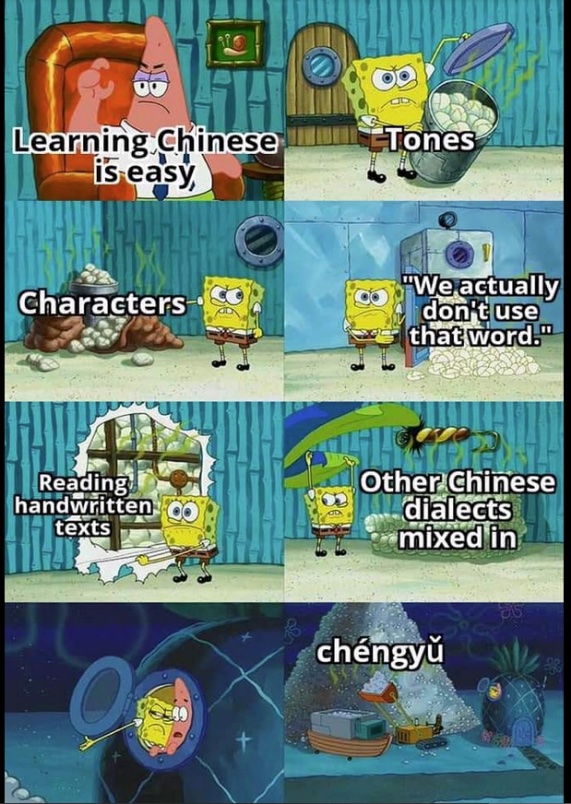Archive for Language teaching and learning
December 9, 2022 @ 6:00 pm· Filed by Victor Mair under Language teaching and learning, Pedagogy, Translation
Two years ago, during the middle of lockdown when we had to teach all of our courses via zoom, one student was conspicuously superior to all the other dozen or so students in my first-year Literary Sinitic / Classical Chinese (LS/CC) class. She was clearly an innately smart student, but in addition she seemed to possess a special knack for grasping the grammar, structure, and meaning of the texts we read day after day. When it came to parsing a particularly difficult passage, she was consistently the one who could figure it out fastest and most accurately. I had no idea to what particular talent or prior training her excellence could be attributed.
I should mention that this student was from China, as were two-thirds of the others. Only one-third of the class were from other countries. I should note, parenthetically, that by and large the more languages a student knows well when he or she takes LS/CC, the better she or he tends to perform in my class. For example, one of the best students in recent years was a Mexican whose native tongue is Spanish and who is advanced in Korean. I let him pronounce the texts in Korean.
Read the rest of this entry »
Permalink
November 8, 2022 @ 5:51 am· Filed by Victor Mair under Language and food, Language teaching and learning
The following note and video were sent to me by Bill Benzon. The video is too long (19:15) to make as the main content of this post, but it is captivating, and I warmly recommend it to anyone who is interested in the topics it covers, especially English language learning by Japanese.
The video features Moe, the former geisha who successfully transitioned to Kimono Mom. Among her interlocutors is a woman from Brazil who has a lot of interesting things to say about Portuguese (especially how different the grammar is from English). Aside from discoursing on language teaching and learning, Moe is very good at talking about food and cooking for her little family, so if you like that sort of thing, hop on her channel (see below) and you will have many popular videos to choose from.
Read the rest of this entry »
Permalink
October 14, 2022 @ 1:08 pm· Filed by Victor Mair under Grammar, Intonation, Language teaching and learning, Parsing, Pedagogy, Translation
One of my favorite books for everyday living is Irma S. Rombauer's Joy of Cooking. The author's cheerful approach to her craft in the kitchen is similar to my jubilant upāya उपाय ("expedient pedagogical means; skill-in-means; skillful means" > fāngbiàn 方便 ["convenient"]) in the classroom.
In my classes, especially Introduction to Literary Sinitic / Classical Chinese (LS/CC), we don't just read through texts with the aid of vocabularies, commentaries, annotations, and grammar notes. We live the texts, act them out, draw them on the board, debate them, chant them, analyze them, get at their profound philosophical significance, plumb their esthetic depths.
Read the rest of this entry »
Permalink
August 5, 2022 @ 5:52 am· Filed by Victor Mair under Language teaching and learning, Mannerisms
In learning Mandarin, after words for "hello", "how are you?", "goodbye", "yes", "no", "thank you", "where", and a couple dozen other basic expressions, one graduates to the next level of linguistic subtlety by learning "polite talk" (kèqì huà 客氣話) such as "bù hǎoyìsi 不好意思" and "bù gǎndāng 不敢當".
Both are well-nigh untranslatable, at least not with a single English term, since their meanings are so context sensitive.
Read the rest of this entry »
Permalink
July 18, 2022 @ 11:55 pm· Filed by Victor Mair under Idioms, Language teaching and learning, Proverbs
From the Facebook page of a friend:

Read the rest of this entry »
Permalink
July 10, 2022 @ 4:41 am· Filed by Victor Mair under Diglossia and digraphia, Emojis and emoticons, Information technology, Language and computers, Language teaching and learning, Typing, Writing systems
[This is a guest post by Paul Shore.]
The 2022 book Kingdom of Characters by Yale professor Jing Tsu is currently #51,777 in Amazon's sales ranking. (The label "Best Seller" on the Amazon search-results listing for it incorporates the amusing mouseover qualification "in [the subject of] Unicode Encoding Standard".) I haven't read the book yet: the Arlington, Virginia library system's four copies have a wait list, and so I have a used copy coming to me in the mail. What I have experienced, though, is a fifty-minute National Public Radio program from their podcast / broadcast series Throughline, entitled "The Characters That Built China", that's a partial summary of the material in the book, a summary that was made with major cooperation from Jing Tsu herself, with numerous recorded remarks by her alternating with remarks by the two hosts: https://www.npr.org/podcasts/510333/throughline (scroll down to the May 26th episode). Based on what's conveyed in this podcast / broadcast episode, I think many people on Language Log and elsewhere who care about fostering a proper understanding of human language among the general public might agree that that ranking of 51,777 is still several million too high. But while the influence of the book's ill-informed, misleading statements about language was until a few days ago mostly confined to those individuals who'd taken the trouble to get hold of a copy of the book or had taken the trouble to listen to the Throughline episode as a podcast (it was presumably released as such on its official date of May 26th), with the recent broadcasting of the episode on NPR proper those nocive ideas have now been splashed out over the national airwaves. And since NPR listeners typically have their ears "open like a greedy shark, to catch the tunings of a voice [supposedly] divine" (Keats), this program seems likely to inflict an unusually high amount of damage on public knowledge of linguistics.
Read the rest of this entry »
Permalink
April 24, 2022 @ 8:34 am· Filed by Victor Mair under Language teaching and learning, Pedagogy, Vernacular
And how (not) to learn Literary Sinitic / Classical Chinese via Mandarin
A "Little Horatian Satire" by E. Bruce Brooks
A section of Classical Chinese Primer by E. Bruce Brooks and A. Taeko Brooks
The dominance of modern-Chinese based curricula may be inevitable in the present political climate, but it is objectively strange all the same. In practice, it prevents the classical language from being acquired by anyone who does not have a use for the usual prerequisite: two or three years of the modern language. The comparative philosophers and historians, the students of ancient technology, and those moved by mere intellectual and literary curiosity, are thus excluded at the outset. Is it healthy for the field, to have nobody to talk to in these neighboring disciplines? And what of the future Chinese classicists themselves, whose linguistic antennae are being tuned, by arduous toil, to a point 2,000 years later than the texts of primary interest to them?
What if the Mediterranean Classicists did as the Sinological Classicists do? An American college freshman with perfect SAT's and a burning desire to investigate the metrics of Horace walks into the Classics program advisor's office and announces her goal. She expects a welcome, and a fast-track Latin class. Instead, she gets the following:
Read the rest of this entry »
Permalink
April 22, 2022 @ 12:40 am· Filed by Victor Mair under Alphabets, Language teaching and learning, Romanization, Writing systems
Referring to the first post in this series, "Hokkien at UCLA" (4/20/22), Chau Wu writes:
I totally agree with you about the Chinese prerequisite.
When I was younger (no, a lot younger) back in Taiwan, I had known a few grandmotherly Christian ladies who were illiterate in Sinitic script but perfectly at home in reading the Taiwanese Bible in Pe̍h-ōe-jī (POJ), i.e., Church Romanization (see below at * for further discussion). The following pictures appeared in the Taiwanese newspaper 自由時報 (Liberty Times) (Hokkien POJ Chū-iû-sî-pò; Hanyu Pinyin Zìyóu Shíbào) a few years ago about a Mrs. Lin (unrelated to any of the ladies I knew of) reading the Bible (Note the Bible shows signs of having been heavily used):

Read the rest of this entry »
Permalink
April 20, 2022 @ 11:00 pm· Filed by Victor Mair under Language extinction, Language teaching and learning, Romanization, Topolects
Article in Taiwan News:
"UCLA students learn about Taiwanese Hokkien in MOE*-supported course:
Course examines Taiwan’s widely-spoken dialect ‘in different forms of cultural production’", By Stephanie Chiang (4/19/22)
*Ministry of Education
UCLA began offering its first Taiwanese Hokkien course in January 2020:
The description of the course entitled “Taiwanese Language and Culture” reads, “Taiyu, or Taiwanese (also known as Minnan, Hoklo, or Hokkien, depending on context or region), is the language that most Taiwanese people use in daily lives, including everyday interaction and communication, entertainment, social and cultural events, etc.” The four-unit course offered to upper-division students requires students to have taken at least a year of Chinese courses or a Chinese placement test showing equivalent knowledge.
I wish they didn't have the prerequisite mentioned in the last sentence and don't understand the reason for such a requirement.
Read the rest of this entry »
Permalink
March 22, 2022 @ 5:50 am· Filed by Victor Mair under Dialects, Intelligibility, Language and politics, Language teaching and learning, Topolects
[This is a guest post by Grant Newsham]
My mother was Rusyn. (Carpatho-Rusyn, Ruthenian, Lemko [in Poland]). Originating in a small village, Volica, up in today's northeast Slovakia — though she grew up in coal country near Pittsburgh. Her first language was Rusyn — but I don't think she really knew exactly what language it was until much later in life. They had no real sense of nationhood. She said she spoke 'Russian' — but referred to it as just 'Kitchen Russian' — or some inferior form of Russian. I think it did kind of bother her – thinking that she was a hillbilly of sorts and speaking uneducated Russian.
However, the language is basically Ukrainian (with some differences) — so close that the Ukrainians don't consider it, or the Rusyns, as distinct entities. After the communists were overthrown, the Slovak government allowed Rusyn nationality (and have set up some Rusyn-language schools [a cousin teaches at one]) and you'll see signs in Rusyn, but the Ukrainians still do not. My grandfather was very clear that they were not Ukrainians.
Read the rest of this entry »
Permalink
March 12, 2022 @ 9:57 pm· Filed by Victor Mair under Dialects, Language and computers, Language and the media, Language teaching and learning, Standard language, Topolects, Writing systems
We've just been through the problems of standard language versus the vernaculars in Arabic (see "Selected readings" below). Now we're going to look at a photograph, a caption, a book review, and a letter to the editor that encompass these contentious issues in spades — but for Chinese. Here's the photograph:

Read the rest of this entry »
Permalink
January 31, 2022 @ 8:03 am· Filed by Victor Mair under Language teaching and learning, Translation, Vocabulary
New article in Japan Times (1/21/22) by Eric Margolis: "Translator trip-ups: What do they mean for learning Japanese?" It is so rich in insights that I will quote from it liberally (well, the whole kit and caboodle, broken up a bit):
In the recent issue of the literary magazine Monkey, which publishes new and old Japanese writing translated into English, a dozen literary translators dished out their thoughts on the hardest words to translate from Japanese into English. These choices ranged from the omnipresent いらっしゃいませ (irasshaimase), which is used as a greeting when entering a store, to sentence endings like the emphatic よ (yo) and the interrogative かしら(kashira, I wonder?).
Examining the words chosen by these translators can shed light on why communication between languages requires so much more than one-to-one translation. It also demonstrates how important it is to have a high level of cultural understanding for speaking fluent Japanese.
I want to take a look at five of these words and dive into why they’re significant and how Japanese learners can embrace and grow by using them. These words are: いらっしゃいませ、おじさん/おばさん (ojisan/obasan, mister/missus), 懐かしい (natsukashii, nostalgic), はあ(hā, an interjection) and 心 (kokoro, heart). Why did translators choose these words as being hard — even impossible — to translate? As we’ll soon see, the parenthetical definitions are woefully insufficient. We’ll need to dive deeper.
Read the rest of this entry »
Permalink
January 23, 2022 @ 8:51 pm· Filed by Victor Mair under Diglossia and digraphia, Emojis and emoticons, Information technology, Language and computers, Language teaching and learning, Typing, Writing systems
Trying to clear up the confusion between the two is a battle we have been waging for decades, and nowhere is the problem more severe than in the study of Sinitic languages and the Sinographic script. The crisis (not a "danger + opportunity"!) has come to the surface again this month with the appearance of a new book by Jing Tsu titled Kingdom of Characters: The Language Revolution That Made China Modern (Riverhead Books, 2022).
The publication of Tsu's book has generated a lot of excitement, publicity, and reviews. Here I would like to call attention to the brief remarks of an anonymous correspondent (a famous, reclusive linguist) that are right on target:
Reimagining "antiquated" Chinese
Reproduced below is the text of a book review in Science that you may not have seen. It is classified as "Linguistics", though the reviewer is a historian at Cal State Poly, Pomona. Notice that Chinese is assumed to be "antiquated" and in need of being "reimagined"! There is simply no sign of Science understanding the difference between a human language and a writing system. This is consistent with the way they have always treated linguistics; they have no idea what the subject really is.
Read the rest of this entry »
Permalink


